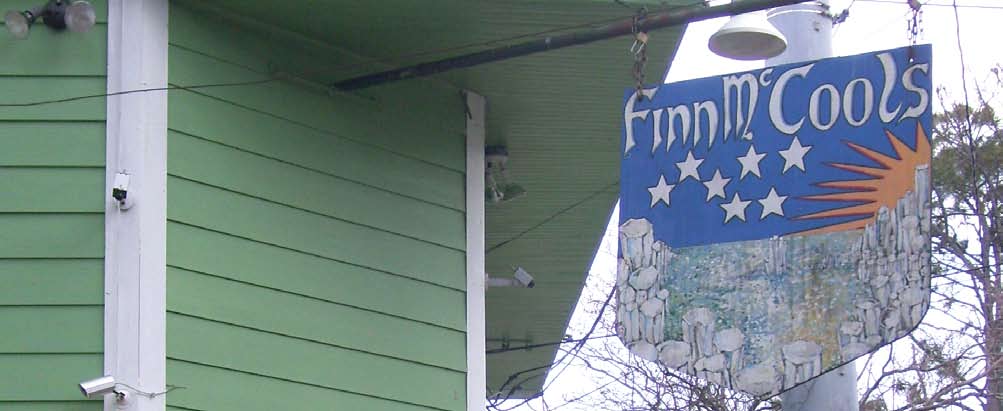A team bands together to become a symbol of New Orleans
If sports is a microcosm of life, as the aphorism goes, New Orleans couldn’t find a better metaphor for its historic blend of passion, sport and drinking than Finn McCool’s Football Club, a hardy band of ex-pats whose gritty post-Katrina determination could serve as a reminder of what has always been best and brightest about our city.
The tale of their quest for football glory and the transplantation of neighborhood football clubs from across the pond has been perfectly told in Finn McCool’s Football Club: The Birth, Death, and Resurrection of a Pub Soccer Team in the City of the Dead (Pelican Publishing), a fine book written by Irish New Orleanian Stephen Rea.
Modern sports writing of this kind has waned ever more gradually since the days of Damon Runyon to become somewhat of a rarity. In Rea’s weaving tale of real life, characters with heart and hard-hitting sport, we rediscover it. Rea, from Belfast, brings to the table an Irish lyricism, intricate wordplay, occasional gravitas and excellent humor, ultimately producing an extremely readable book that is snapshot of our city’s times.
Unbeknownst to many local sports fans, another brand of organized football is beloved here in New Orleans, but it has nothing to do with the black and gold. European football, better known as soccer, is played with just as much vigor and tradition as the game on the gridiron. The Southeastern Louisiana Adult Soccer Association is a men’s recreational league whose season extends from February to May, and its epicenter is found at Finn McCool’s, a Mid-City pub.
On the walls inside, you’ll find Jax, Dixie and Regal beer trays sharing space with Celtic football club banners and championship marquees; antique rifles and Irish hurley sticks; a Celtic cross and an MRE bag—a true commingling of all things Irish and New Orleanian. Expatriates from Ireland, along with Scotland and England, gather with walk-in soccer fanatics on Saturday and Sunday mornings to enjoy the Premier League matches televised live from pitches back home, places like Glasgow, Manchester, Liverpool and London. The love of these teams—Celtic, Rangers, Chelsea, Arsenal, Man U., Everton and others—begins in the neighborhoods and the pubs, not unlike Finn McCool’s, and it runs like blood through veins all the way to the Big Easy.
Far quieter than a typical NFL crowd at the start (perhaps the early hour has something to do with that), the fans’ furor and enthusiasm build, especially as this town’s only decent Guinness gets poured into the afternoon. This is a pub in the best tradition, where the owners not only man the bar but will likely greet you when you enter and remember you later.
With its continual, ambiguous rule tweaking, NFL football has morphed from the somewhat violent game founded on rugby to become a mere shadow of the one played in the days of Teddy Roosevelt. The kind of football watched at McCool’s, and played by its patrons, is one of long periods of gradually building tension and taunts culminating in an explosion of shots and controversy. This football is sublime in its lack of surreal penalty calls and referee intervention (though what passes for game-deciding penalty kicks can sometimes be quite mysterious in origin). It is quick, athletic, tenacious, smart, filled with proficient tackling and suffused with skill. The result just flows. It essentially depends on fair play and deft passing, to such an essential degree that it shows a lot about the character of the players themselves (indeed, the pub recently had a fundraiser for a patron and fellow player who was sick). What it emphasizes most about sport is that it’s the passion that matters, the expertise and the knowledge about how to strike a ball just right so it can’t be stopped by anyone, no matter the circumstances, and the beauty of that when it happens. These football fanatics have a hundred years of such knowledge and as Finn McCool’s Football Club shows, it can bridge generations, cultures and oceans.
Using soccer as his device, Rea also bridges time, from the peaceful days at the founding of Finn McCool’s Football Club to the dark days of Hurricane Katrina. We follow the team as it deals with the impending hurricane to its aftermath, when the team breaks up and its roster is scattered around the world. And we rejoice in the unlikely recovery—of the team, its members and the city itself. The history of the club, as told by Rea, reflects New Orleans’ own history of attracting all sorts of personalities—the motley, the brilliant, the drinkers, the sober, the dreamers and the builders—to create something new out of the surrounding swamp. It’s an unlikely success story in an unlikely city that has had some remarkable challenges and victories along the way and despite all odds is still here.

